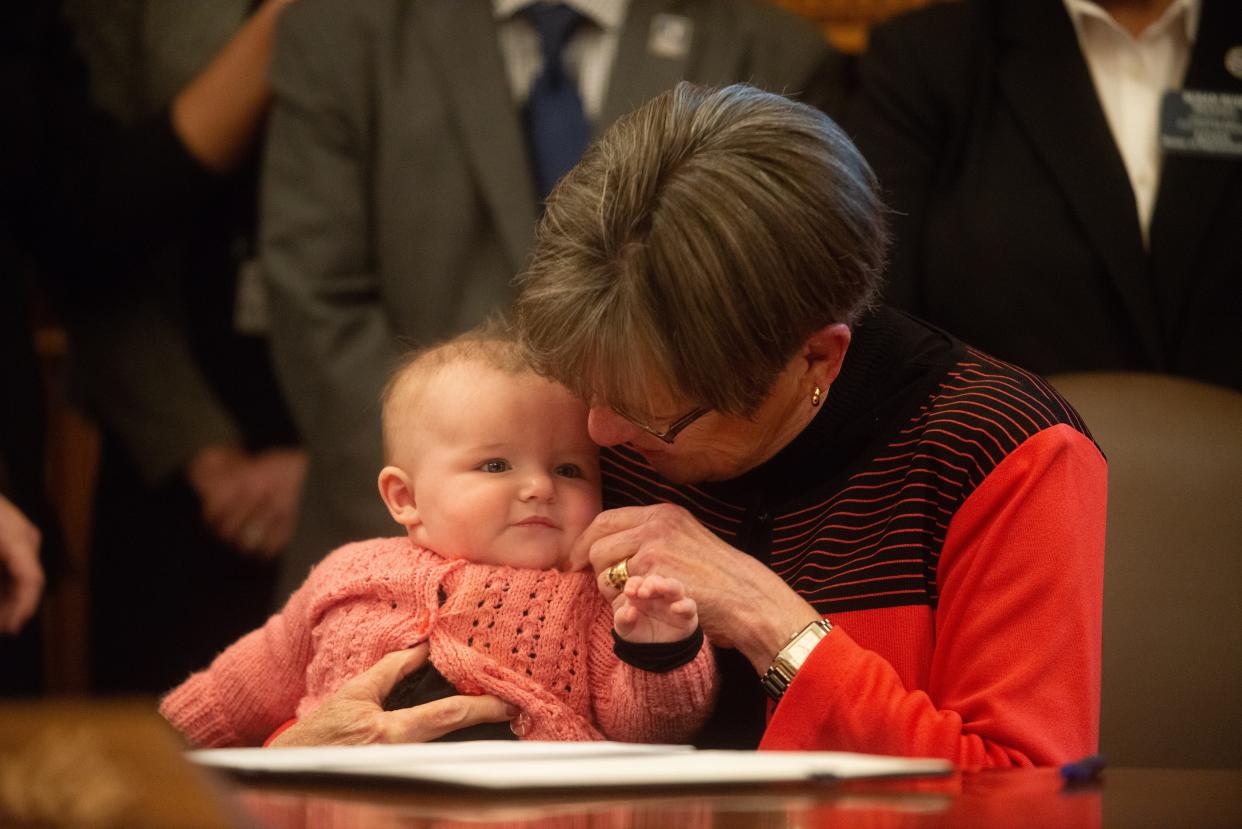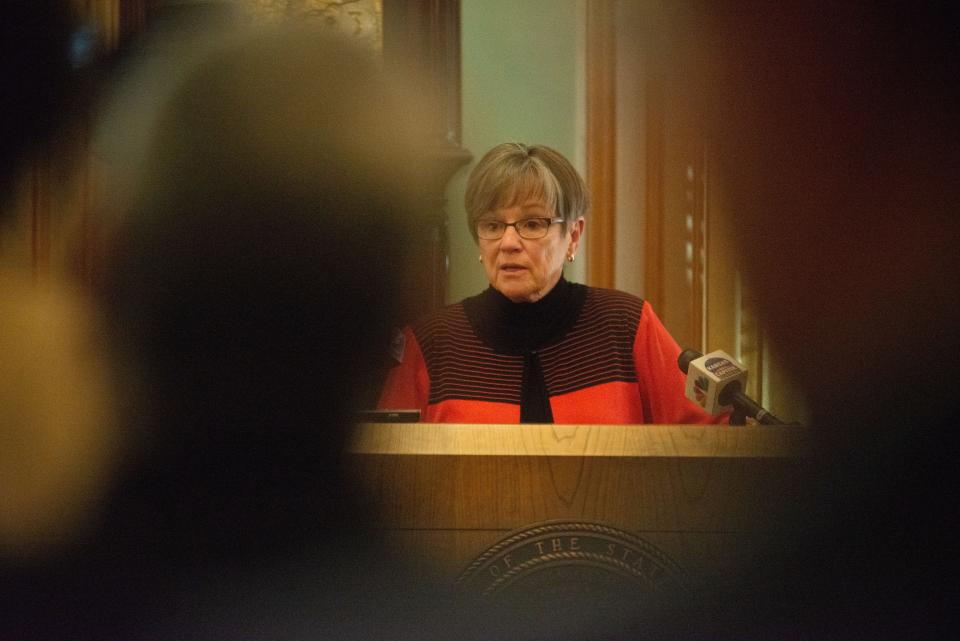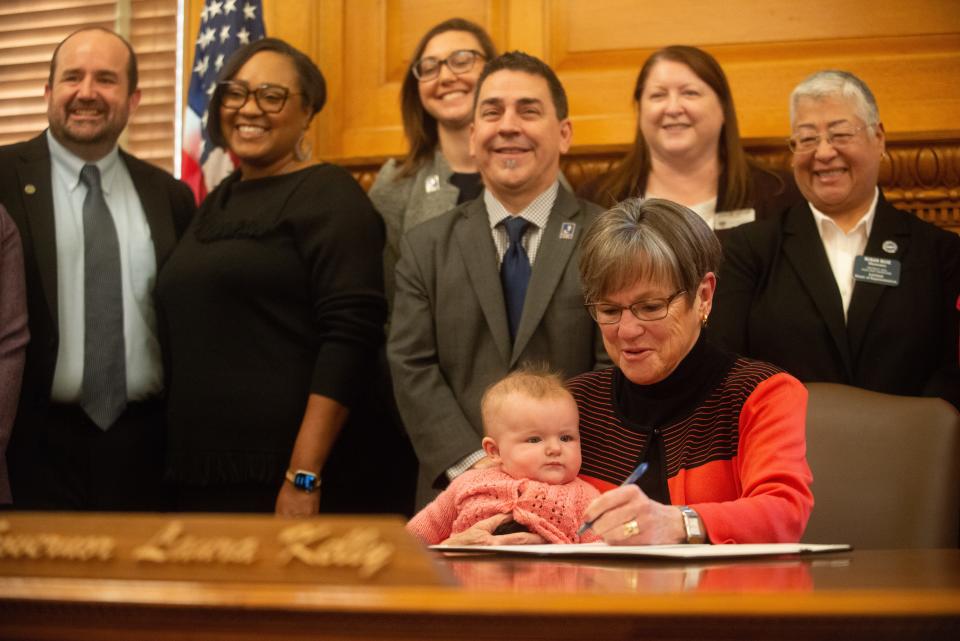Kansas governor creates task force for cabinet-level child care office via executive order

- Oops!Something went wrong.Please try again later.
With her 4-month-old granddaughter on her lap, Gov. Laura Kelly signed an executive order Tuesday that could pave the way for a new government agency tasked with addressing child care issues in Kansas.
Kelly's first executive order of her second term creates a task force with the goal of drafting a report by early 2024 that supports the governor's reelection campaign promise of creating a new cabinet-level position on child care. The new agency would be tasked with expanding the quality, quantity and affordability of child care.
"We know that the earliest years of childhood are crucial to determining the trajectory of people's entire lives, including their economic health, their social outcomes and their educational opportunities," Kelly said. "If we want to give our kids the best possible future, then we must give them the strongest possible start. That includes providing access to high quality care and education."
Kansas Action for Children president and CEO John Wilson applauded Kelly's action, as did Kansas Children’s Cabinet executive director Melissa Rooker, Kansas Department of Health and Environment secretary Janet Stanek and Kansas Department for Children and Families secretary Laura Howard.
"The best policies and proposals are those that have been shaped by diverse stakeholders, which is why I am excited for the work of this task force," Wilson said.
More:Kansas Gov. Laura Kelly tests positive for COVID after ball, inauguration, order signing
Task force is a step to fulfilling campaign promise

The Early Childhood Transition Task Force is a step toward Kelly fulfilling a campaign campaign promise from the 2022 election.
Materials from Kelly's reelection campaign proposed centralizing all child care programs and responsibilities under a secretary of early childhood development tasked with streamlining the processes. The position would focus on children ages newborn to 5 years old while working to increase both the quantity and quality of affordable child care while coordinating with the K-12 education system on early learning opportunities.
Kansas currently has child care and early childhood education programs split across four separate state agencies: Kansas Department for Children and Families, Kansas Department of Health and Environment the Kansas Children's Cabinet and the Kansas Department of Education.
"While each of these entities works diligently to provide quality services, having services segregated into silos creates inefficiencies, redundancies, service gaps and confusion for providers and families alike," Kelly said.
Kelly said she is unsure whether creating such an agency would require an act of the Legislature or if she could use an executive order, but she would prefer to work with legislators.
If Kelly ultimately uses her pen, it would not be the first time she created an executive office on child issues while circumventing the Legislature. In fall 2021, she created the Division of the Child Advocate to support children and families on foster care and child welfare issues after a divided House and Senate failed to create such a position.
Kelly said the COVID-19 pandemic is why she did not create the task force in her first term. She said a task force is necessary because "we want to get it right."
Child care shortage feeds workforce shortage

Greater Topeka Chamber of Commerce president Curtis Sneden told The Capital-Journal that addressing workforce challenges, particularly with child care, is a top priority this session.
"Almost every business owner I talk to is struggling to find people to work for them," Sneden said. "There are a number of factors; a key is the lack of available child care."
A Kansas Chamber poll of business leaders found that "65% agree that a lack of access to childcare keeps Kansans out of the workforce."
"It's complicated enough that there won't be some one bill in the Legislature that solves it," Sneden said. "But there are initiatives that can be undertaken at the policy level and out in the marketplace to try to bring more child care capacity on board."
In June, the governor's office released a supply and demand report from Child Care Aware of Kansas that showed the number of licensed family homes dropped by 275 between 2019 and 2021.
Child care capacity for infants and toddlers tends to be more limited due to child to staff ratios and license capacity laws. Shawnee County is among the 30 counties that fair the best, with one to 10 children per opening. But elsewhere in the state, especially in rural areas, there are more than 40 children per opening, if there are any openings at all.
Child Care Aware reports that Shawnee County currently has 314 total licensed child care facilities, down from 332 in 2021 and 346 in 2020. The desired capacity of those facilities could meet 43% of the potential demand for children younger than 6 with all parents in the labor force.
Average costs for full-time care at family homes range from about $708 a month for an infant to $545 for 5- and 6-year-olds.
The Kelly administration has boasted of $270 million "invested" in early childhood efforts over the past four years after what the governor said was not enough investment historically. She touted child care as a way to support economic growth.
Kelly said the notion of one parent earning enough money at work for another parent to stay home and care for the children "has not been reality for many years now."
"And I'm not sure people want to go there," she said. "What people want is to have access to good, affordable child care."
More:Attorney General Kris Kobach sets sights on these possible environmental litigation issues
Is there room for political compromise on child care?
Child care has become an area of politics where both political parties, as well as lobbyists, agree action is needed.
"It is a nonpartisan issue that affects all Kansans, rural and urban alike, and addressing it pays dividends for everyone in the state," Kelly said.
But when Republican lawmakers rolled out their own legislative agenda on Tuesday — 30 minutes after Kelly made her announcement — child care was not mentioned in their 30-point plan.
During campaign season, Republicans blamed government regulation for the shortage of child care. Gubernatorial candidate Derek Schmidt's running mate, Katie Sawyer, penned a column in the Capital-Journal that included blaming bureaucratic hurdles in the state's regulatory system for providers struggling to stay open, let alone open in the first place. She did not cite any specific regulations. A response by Kelly's Lt. Gov. and Commerce Secretary David Toland argued the administration was knocking down bureaucratic barriers.
Kelly said Tuesday that "it is time to revisit" child care regulations after she was part of a deep dive a decade ago.
Last week, the Kansas Chamber announced a legislative agenda that backs "policies to make childcare more affordable and accessible for Kansas workers by relaxing overly restrictive staff-to-child ratios and increasing childcare capacity across age groups."
Legislators discussed the issue two months ago in a meeting on workforce challenges. Rooker, of the Kansas Children's Cabinet, said regulatory changes had already been proposed by the Kansas Department of Health and Environment to allow four infants instead of three infants per one adult.
More:Kansas businesses are short workers. What can state government do to help?
But Rooker warned against further loosening the ratio.
"Keep in mind, the point of the infant ratio, these are tiny human beings who cannot walk," she said at the November meeting. "If a fire erupts, the point of the ratio is how many infants can one adults safely evacuate from a building, and I think four is kind of pushing the limit."
Rooker blamed low wages for a shortage of child care workers. Dave Trabert, of the Kansas Policy Institute, responded that employers might pay child care workers more money if their taxes were lower.
Rooker said a new state tax credit will help businesses provide child care, but the program is too new to have useful data showing whether it is working.
This article originally appeared on Topeka Capital-Journal: Laura Kelly order proposes new Kansas government agency on child care

